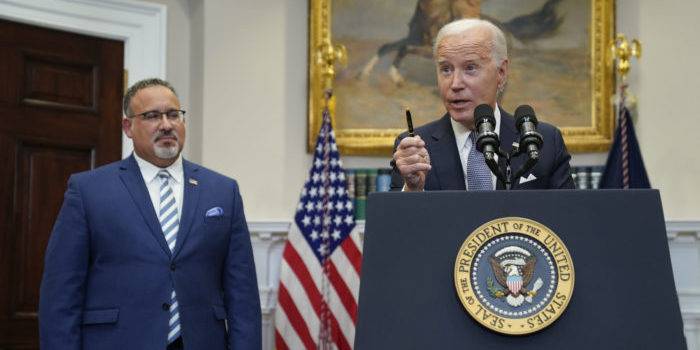(Headline USA) Despite a ruling from the nation’s highest court last year that explicitly told him his loan-cancellation policies were unconstitutional and should go through Congress, President Joe Biden continued to show his disdain for the rule of law as he desperately seeks to regain his fast-eroding support among younger voters.
The Biden administration will start canceling student loans for some borrowers starting in February as part of a new repayment plan that’s taking effect nearly six months ahead of schedule.
Loan cancellation was originally set to begin in July under the new SAVE repayment plan, but it’s being accelerated to provide faster relief to borrowers as Biden faces the prospect of a humiliating defeat in the Jan. 23 New Hampshire primary.
Hoping instead to give Biden a boost in the more black-dominated South Carolina primary, Democrats had tried to block New Hampshire from holding its first-in-the-nation primary by threatening to withhold its electors at the August convention, but New Hampshire officials scoffed at the ultimatum.
On Friday, Biden said in as statement that the new loan-amnesty scheme was part of an effort “to act as quickly as possible to give more borrowers breathing room” and move on from their student debt.
The loan cancellation programs do not actually wipe away student debt but transfer it from the borrowers onto taxpayers at large, thereby exacerbating the already out-of-control inflation and federal debt concerns that have brought the U.S. economy to the brink of disaster. From September to January, the country’s debt increased as much as its entire debt in 1981, when it first hit the trillion-dollar mark. It now stands at $34 trillion.
Borrowers will be eligible for cancellation if they are enrolled in the new SAVE plan, if they originally borrowed $12,000 or less to attend college, and if they have made at least 10 years of payments. The Education Department said it didn’t immediately know how many borrowers will be eligible for cancellation in February.
Biden announced the new repayment plan last year alongside a separate plan to cancel up to $20,000 in loans for millions of Americans. The Supreme Court struck down his plan for widespread forgiveness, but the repayment plan has so far escaped that level of legal scrutiny. Republicans in Congress tried unsuccessfully to block the new repayment plan through legislation and a resolution last year.
The new plan offers far more generous terms than several other income-driven repayment plans that it’s meant to replace. Previous plans offered cancellation after 20 or 25 years of payments, while the new plan offers it in as little as 10. The new plan also lowers monthly payments for millions of borrowers.
Those who took out more than $12,000 will be eligible for cancellation but on a longer timeline. For each $1,000 borrowed beyond $12,000, it adds an additional year of payments on top of 10 years.
The maximum repayment period is capped at 20 years for those with only undergraduate loans and 25 years for those with any graduate school loans.
The Biden administration says next month’s relief will particularly help Americans who attended community colleges, which generally cost less than four-year universities. The plan aims to place community college students “on a faster track to debt forgiveness than ever before,” Education Secretary Miguel Cardona said.
Counterintuitively, those with smaller student loan balances tend to struggle more. It’s driven by millions of Americans who take out student loans but don’t finish degrees, leaving them with the downside of debt without the upside of a higher income.
Republicans have railed against the new repayment plan, saying it helps wealthier Americans with college degrees at the expense of taxpayers who didn’t attend college. Some say it’s a backdoor attempt to make community college free, an idea that Biden campaigned on but that failed to win support in Congress.
Starting next month, the Education Department says it will automatically wipe away balances for eligible borrowers enrolled in the SAVE plan. The department will email borrowers who might be eligible but have not enrolled.
Some of the plan’s provisions took hold last summer—it prevents interest from snowballing as long as borrowers make monthly payments, and it makes more Americans eligible to get their monthly bill lowered to $0.
Other parts are scheduled to take effect in July, including a change to limit borrowers’ payments to 5% of their discretionary income, down from 10% in previous income-driven repayment plans.
The Biden administration is separately pursuing another plan for widespread cancellation. After the Supreme Court rejected Biden’s first plan, he asked the Education Department to try again under a different legal authority. The department has been working on a new proposal that would provide relief to targeted groups of borrowers.
Adapted from reporting by the Associated Press

